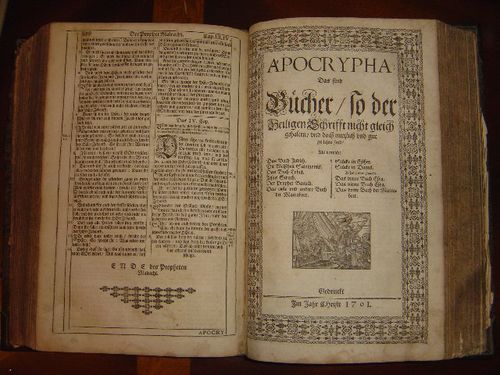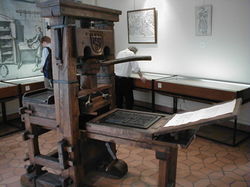Difference between revisions of "Category:OT Apocrypha Studies--1450s"
| (4 intermediate revisions by the same user not shown) | |||
| Line 1: | Line 1: | ||
{| style="margin-top:10px; background:none;" | |||
| style="background:white; width:65%; border:1px solid #a7d7f9; vertical-align:top; color:#000; padding: 5px 10px 10px 8px; -moz-border-radius: 10px; -webkit-border-radius: 10px; border-radius:10px;" | | |||
<!-- ===================== COLONNA DI SINISTRA ==================== --> | |||
{| cellpadding="2" cellspacing="5" style="width:100%; vertical-align:top; background:transparent;" | |||
{{WindowMain | |||
|title= [[OT Apocrypha Studies]] ([[1450s]]) | |||
|backgroundLogo= Bluebg_rounded_croped.png | |||
|logo= history.png | |||
|px= 38 | |||
|content= [[File:OT Apocrypha.jpg|500px]] | |||
'''OT Apocrypha Studies | The page: '''OT Apocrypha Studies--1450s''' includes (in chronological order) scholarly and literary works in the field of [[OT Apocrypha Studies]] made in the [[1450s|second half of the 15th century]], or from 1450 to 1499. | ||
}} | |||
{{WindowMain | |||
|title= Highlights ([[1450s]]) | |||
|backgroundLogo= Bluebg_rounded_croped.png | |||
|logo = contents.png | |||
|px= 38 | |||
|content= | |||
}} | |||
== | {{WindowMain | ||
|title= [[Interpreters]] ([[1450s]]) | |||
|backgroundLogo= Bluebg_rounded_croped.png | |||
|logo = contents.png | |||
|px= 38 | |||
|content= | |||
}} | |||
|} | |||
|<!-- SPAZI TRA LE COLONNE --> style="border:5px solid transparent;" | | |||
<!-- ===================== COLONNA DI DESTRA ==================== --> | |||
| style="width:35%; border:1px solid #a7d7f9; background:#f5faff; vertical-align:top; padding: 5px 10px 10px 8px; -moz-border-radius: 10px; -webkit-border-radius: 10px; border-radius:10px;"| | |||
{| id="mp-right" cellpadding="2" cellspacing="5" style="width:100%; vertical-align:top; background:#f5faff; background:transparent;" | |||
{{WindowMain | |||
|title= [[Timeline]] ([[1450s]]) | |||
|backgroundLogo= Bluebg_rounded_croped.png | |||
|logo = contents.png | |||
|px= 38 | |||
|content= [[File:1450s.jpg|thumb|left|250px]] | |||
'''''[[OT Apocrypha Studies]]''''' : [[:Category:OT Apocrypha Studies--2020s|2020s]] -- [[:Category:OT Apocrypha Studies--2010s|2010s]] -- [[:Category:OT Apocrypha Studies--2000s|2000s]] -- [[:Category:OT Apocrypha Studies--1990s|1990s]] -- [[:Category:OT Apocrypha Studies--1980s|1980s]] -- [[:Category:OT Apocrypha Studies--1970s|1970s]] -- [[:Category:OT Apocrypha Studies--1960s|1960s]] -- [[:Category:OT Apocrypha Studies--1950s|1950s]] -- [[:Category:OT Apocrypha Studies--1940s|1940s]] -- [[:Category:OT Apocrypha Studies--1930s|1930s]] -- [[:Category:OT Apocrypha Studies--1920s|1920s]] -- [[:Category:OT Apocrypha Studies--1910s|1910s]] -- [[:Category:OT Apocrypha Studies--1900s|1900s]] -- [[:Category:OT Apocrypha Studies--1850s|1850s]] -- [[:Category:OT Apocrypha Studies--1800s|1800s]] -- [[:Category:OT Apocrypha Studies--1700s|1700s]] -- [[:Category:OT Apocrypha Studies--1600s|1600s]] -- [[:Category:OT Apocrypha Studies--1500s|1500s]] -- [[:Category:OT Apocrypha Studies--1450s|1450s]] -- [[OT Apocrypha Studies|Home]] | |||
'''''[[Timeline]]''''' : [[2020s]] -- [[2010s]] -- [[2000s]] -- [[1990s]] -- [[1980s]] -- [[1970s]] -- [[1960s]] -- [[1950s]] -- [[1940s]] -- [[1930s]] -- [[1920s]] -- [[1910s]] -- [[1900s]] -- [[1850s]] -- [[1800s]] -- [[1700s]] -- [[1600s]] -- [[1500s]] -- [[1450s]] -- [[Medieval]] -- [[Timeline|Home]] | |||
}} | |||
{{WindowMain | |||
|t'''itle= [[Languages]] | |||
|backgroundLogo= Bluebg_rounded_croped.png | |||
|logo= contents.png | |||
|px= 38 | |||
|content= [[File:Languages.jpg|thumb|left|250px]] | |||
'''''[[OT Apocrypha Studies]]''''' : [[:Category:OT Apocrypha Studies--English|English]] -- [[:Category:OT Apocrypha--French|French]] -- [[:Category:OT Apocrypha Studies--German|German]] -- [[:Category:OT Apocrypha Studies--Italian|Italian]] -- [[:Category:OT Apocrypha Studies--Spanish|Spanish]] -/- [[OT Apocrypha Studies|Other]] | |||
}} | |||
|} | |||
|} | |||
== History of Research ([[1450s]]) -- Notes == | |||
When in 390-405 Jerome in the Vulgate translated into Latin all the OT books listed by the Councils of Hippo (339 CE) and Carthage (397 CE), he expressed some reservations about a group of documents that he labelled as "apocryphal" since they were not included in the Rabbinic Canon or Hebrew Bible. The principle of ''Hebraica veritas'', however, did not win the day. Although not denying the value of the Hebrew texts, Augustine and the majority of Church leaders insisted that the Latin canon had to follow the Septuagint, which already in the Hellenistic Jewish communities had acquired a status equal to the Biblia Hebraica. Skepticism was never completed silenced and along the centuries resurfaced in the works influential theologians like Hugh of St. Victor (12th century). The prevalent view, reiterated in 1442 at the Council of Florence, remained nonetheless that all books in the Vulgate had to be considered "canonical" including Jerome's "apocryphal" books. | When in 390-405 Jerome in the Vulgate translated into Latin all the OT books listed by the Councils of Hippo (339 CE) and Carthage (397 CE), he expressed some reservations about a group of documents that he labelled as "apocryphal" since they were not included in the Rabbinic Canon or Hebrew Bible. The principle of ''Hebraica veritas'', however, did not win the day. Although not denying the value of the Hebrew texts, Augustine and the majority of Church leaders insisted that the Latin canon had to follow the Septuagint, which already in the Hellenistic Jewish communities had acquired a status equal to the Biblia Hebraica. Skepticism was never completed silenced and along the centuries resurfaced in the works influential theologians like Hugh of St. Victor (12th century). The prevalent view, reiterated in 1442 at the Council of Florence, remained nonetheless that all books in the Vulgate had to be considered "canonical" including Jerome's "apocryphal" books. | ||
When the first editions and translations of the Bible were published in the second half of the 15th century, they were all based on the Vulgate and all included the "apocryphal" books of Jerome. | When the first editions and translations of the Bible were published in the second half of the 15th century, they were all based on the Vulgate and all included the "apocryphal" books of Jerome. | ||
Latest revision as of 16:04, 19 December 2019
|
|
OT Apocrypha Studies : 2020s -- 2010s -- 2000s -- 1990s -- 1980s -- 1970s -- 1960s -- 1950s -- 1940s -- 1930s -- 1920s -- 1910s -- 1900s -- 1850s -- 1800s -- 1700s -- 1600s -- 1500s -- 1450s -- Home Timeline : 2020s -- 2010s -- 2000s -- 1990s -- 1980s -- 1970s -- 1960s -- 1950s -- 1940s -- 1930s -- 1920s -- 1910s -- 1900s -- 1850s -- 1800s -- 1700s -- 1600s -- 1500s -- 1450s -- Medieval -- Home
{{{title}}}
|
History of Research (1450s) -- Notes
When in 390-405 Jerome in the Vulgate translated into Latin all the OT books listed by the Councils of Hippo (339 CE) and Carthage (397 CE), he expressed some reservations about a group of documents that he labelled as "apocryphal" since they were not included in the Rabbinic Canon or Hebrew Bible. The principle of Hebraica veritas, however, did not win the day. Although not denying the value of the Hebrew texts, Augustine and the majority of Church leaders insisted that the Latin canon had to follow the Septuagint, which already in the Hellenistic Jewish communities had acquired a status equal to the Biblia Hebraica. Skepticism was never completed silenced and along the centuries resurfaced in the works influential theologians like Hugh of St. Victor (12th century). The prevalent view, reiterated in 1442 at the Council of Florence, remained nonetheless that all books in the Vulgate had to be considered "canonical" including Jerome's "apocryphal" books.
When the first editions and translations of the Bible were published in the second half of the 15th century, they were all based on the Vulgate and all included the "apocryphal" books of Jerome.
Pages in category "OT Apocrypha Studies--1450s"
The following 7 pages are in this category, out of 7 total.


